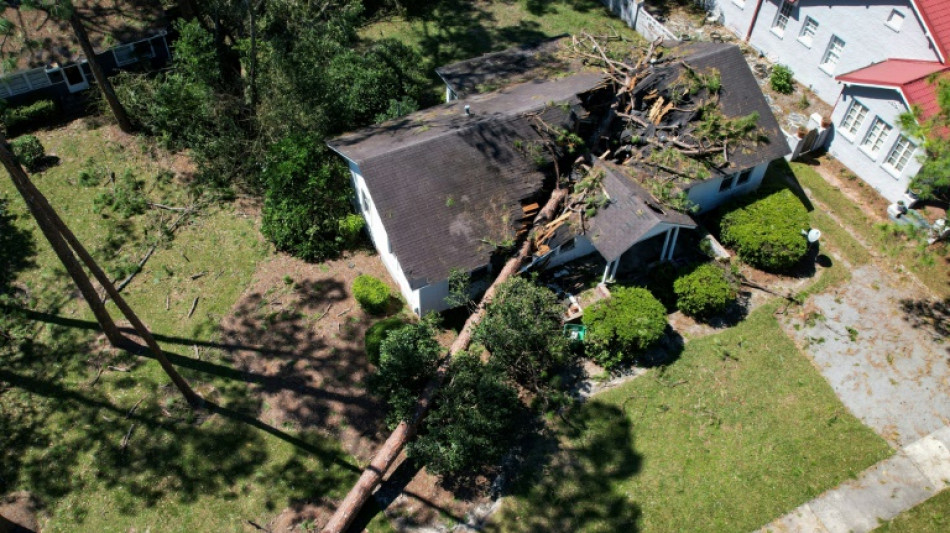
RBGPF
59.2400

The death toll from powerful Storm Helene has reached at least 63, authorities said Saturday, as responders, hampered by washed-out bridges and debris-strewn roads, searched house-by-house for survivors in devastated parts of several southern and eastern US states.
At least 24 people died in South Carolina, 17 in Georgia, 11 in Florida, 10 in North Carolina and one in Virginia, according to updated reports from local authorities and media tallied by AFP.
Helene slammed into Florida late Thursday as a Category 4 hurricane and surged north, gradually weakening but leaving a path of destruction.
Federal emergencies were declared in six states -- Alabama, Florida, Georgia, North Carolina, South Carolina and Tennessee -- with more than 800 personnel from the Federal Emergency Management Administration (FEMA) deployed to assist local officials.
Repair crews were already at work Saturday, and the National Weather Service said conditions would "continue to improve today following the catastrophic flooding over the past two days."
But it warned of possible "long-duration power outages."
More than 2.7 million customers were still without electricity across 10 states from Florida in the southeast to Indiana in the midwest as of Saturday night, according to tracker poweroutage.us.
- 'It breaks my heart' -
Helene originally slammed into Florida's northern Gulf shore with powerful winds of 140 miles (225 kilometers) per hour. Even as a weakened post-tropical cyclone, it has wreaked havoc.
Record levels of flooding had threatened to break through several dams, but Tennessee emergency officials said Saturday that the Nolichucky Dam -- which had been close to breaching -- was no longer in danger of giving way and people downriver could return home.
Massive flooding was reported in Asheville, in western North Carolina. Governor Ray Cooper called it "one of the worst storms in modern history" to hit his state.
Some residents in South Carolina -- a state that is no stranger to hurricanes -- said Helene was the worst storm to hit in 40 years.
There were reports of remote towns in the Carolina mountains without power or cell service, their roads washed away or buried by mudslides.
In Cedar Key, an island city of 700 people off Florida's Gulf Coast, the full destructive force of the hurricane was on view.
Several pastel-colored wooden homes were destroyed, victims of record storm surges and ferocious winds.
"I've lived here my whole life, and it breaks my heart to see it. We've not really been able to catch a break," said Gabe Doty, a Cedar Key official, referring to two other hurricanes in the past year.
- 'Gut punch' -
In South Carolina, the dead included two firefighters, officials said.
Georgia's 17 deaths included an emergency responder, according to state officials.
Florida Governor Ron DeSantis said the damage from Helene exceeded that of hurricanes Idalia and Debby, which both hit the same region southeast of Tallahassee in the last 13 months.
"It's a real gut punch to those communities," DeSantis told Fox News.
And in the Tennessee town of Erwin, a dramatic rescue operation unfolded, as more than 50 patients and staff trapped on a hospital roof by surging floodwaters had to be rescued by helicopters.
Remnants of the weakened storm dumped water Saturday over the lower midwest.
- 'Overwhelming' damage -
In a statement Saturday, President Joe Biden called Helene's devastation "overwhelming."
Biden was briefed by FEMA administrator Deanne Criswell and Homeland Security Advisor Liz Sherwood-Randall on "the tragic loss of life across the region," the White House said.
"The president directed them to continue to focus on how the Biden-Harris administration can speed support to impacted survivors and accelerate recovery efforts, including the immediate deployment of additional search and rescue teams into North Carolina," it added.
Criswell, who went to Florida on Saturday to survey damage, will visit Georgia on Sunday and North Carolina on Monday to assess the federal response to the storm's impact.
September has been an unusually wet month around the world, with scientists linking some extreme weather events to human-caused global warming.
G.Koya--DT